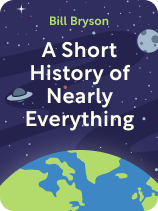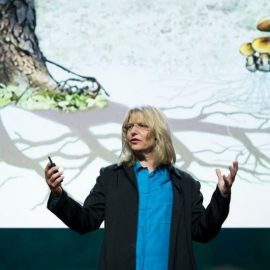

This article is an excerpt from the Shortform book guide to "A Short History of Nearly Everything" by Bill Bryson. Shortform has the world's best summaries and analyses of books you should be reading.
Like this article? Sign up for a free trial here.
Why is the cosmos fine-tuned for life? Where is the universe’s missing mass? Why is the expansion of the cosmos speeding up?
In a discussion of the origin and history of the universe, Bill Bryson brings up several questions that scientists have yet to answer conclusively. He also shares what some of the answers might be.
Keep reading to learn about three intriguing mysteries of the cosmos.
Why Is the Universe Fine-Tuned for Life?
The first mystery of the cosmos is that many of its parameters seem to have been optimized to just the right values that would support human life. Yet, scientists have not identified any physical principle or mechanism that would constrain all these parameters to have just the right values to eventually support life on Earth.
Bryson himself conjectures that maybe the answer is that life evolved to match the conditions that existed. So the universe isn’t fine-tuned for us—we’ve been fine-tuned for it by millions of years of natural selection.
Where Is the Rest of the Mass in the Universe?
Scientists can use general relativity to calculate the mass of the universe. When they do, the number they get is 10 to 100 times greater than the total estimated mass of all the stars, galaxies, and other objects that they can detect in the universe.
According to Bryson, no one knows for sure how to account for this discrepancy, although most scientists favor one of two possible explanations. One explanation holds that missing mass consists of objects that just don’t emit or reflect enough light for astronomers to detect.
The other explanation is that there’s a type of matter that interacts only through gravity, making it fundamentally impossible to detect except by observing its gravitational influence on visible matter.
Why Is the Expansion of the Universe Accelerating?
Theoretically, gravity should cause the expansion rate of the universe to slow down over time. But recent measurements indicate that its rate of expansion is actually increasing. As Bryson explains, scientists can account for this in their mathematical models by adding in a fudge factor called the “cosmological constant.” But, he says there’s no consensus on what’s physically causing the expansion rate to increase.
(Shortform note: As with the missing mass, there are other theories that provide alternate solutions. If, as the alternative model we mentioned above implies, gravity gets weaker over time, then the expansion rate of the universe isn’t actually increasing. Instead, it only appears to be increasing because the method scientists use to calculate the distance to distant galaxies assumes that gravity is constant. Another alternative theory suggests that the speed of light decreases over time. This has the same effect of turning the accelerating expansion into an illusion of acceleration, since scientists also assume that the speed of light is constant when calculating the distance to distant galaxies.)

———End of Preview———
Like what you just read? Read the rest of the world's best book summary and analysis of Bill Bryson's "A Short History of Nearly Everything" at Shortform.
Here's what you'll find in our full A Short History of Nearly Everything summary:
- An accessible overview of the natural sciences
- A full history of the universe, Earth, and life as we know it
- A look at the unknowns and controversies that still exist in the sciences






